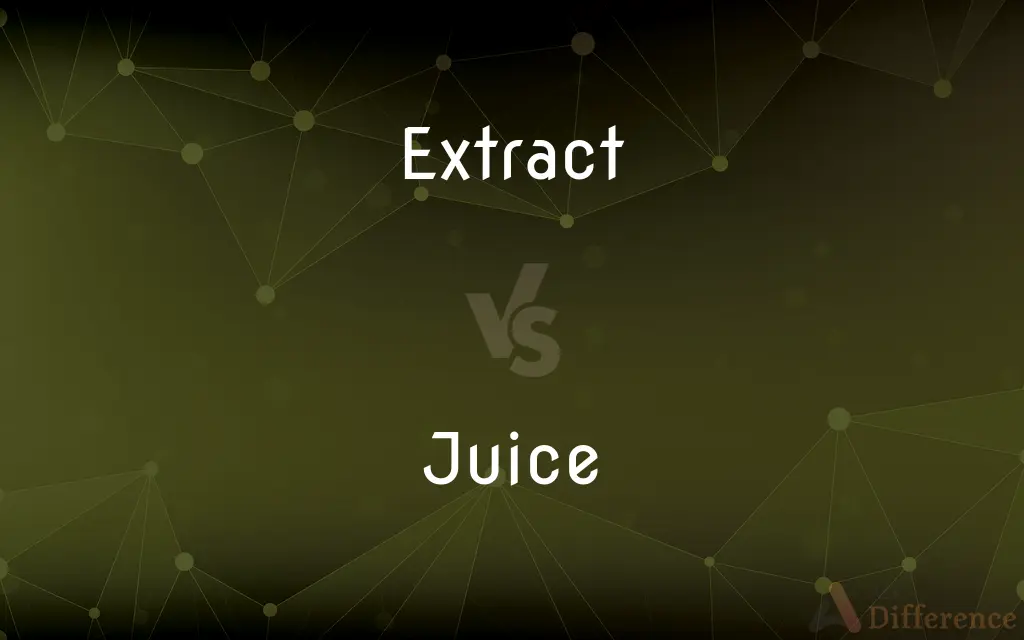Extract vs. Juice — What's the Difference?
By Tayyaba Rehman & Maham Liaqat — Updated on April 17, 2024
Extract is a concentrated substance obtained by separating it from a component mixture, while juice is a liquid that naturally comes from fruits or vegetables.

Difference Between Extract and Juice
Table of Contents
ADVERTISEMENT
Key Differences
Extracts are typically obtained through processes that separate a desired component from others in a material, using methods like distillation, infusion, or pressing. Whereas, juice is directly squeezed or pressed from fruits or vegetables, retaining most of the natural substances including water, sugar, and vitamins.
An extract, being concentrated, is often more potent and used in smaller quantities, such as vanilla extract used in baking. On the other hand, juice is consumed in larger amounts and can be a primary beverage or ingredient, providing hydration and nutritional benefits.
While extracts are often used to provide flavor or active ingredients in cooking, cosmetics, and even in medicine, juice is predominantly a dietary item, consumed for its taste, nutritional value, and refreshment qualities.
The extraction process can involve solvents or heat and usually targets a specific set of compounds, such as essential oils or caffeine. In contrast, juicing is a mechanical process that does not alter the chemical structure of the juice components.
Extracts can come from various parts of a plant, including roots, leaves, or bark, and not just fruits or vegetables. Juice, however, is typically derived from the fruit or vegetable flesh and is rarely made from other plant parts.
ADVERTISEMENT
Comparison Chart
Definition
Concentrated substance obtained by separating specific components.
Liquid obtained by pressing or squeezing fruits or vegetables.
Primary Use
Flavoring, medicinal, or active ingredients in various products.
Consumption as a beverage or dietary component.
Method of Creation
Distillation, infusion, pressing with solvents.
Mechanical pressing or squeezing without chemical alteration.
Potency
Highly concentrated, used in small quantities.
Less concentrated, consumed in larger volumes.
Source Materials
Can be derived from various plant parts.
Typically made from the edible parts of fruits or vegetables.
Compare with Definitions
Extract
A substance made by extracting a part of a raw material.
The chef used lemon extract to enhance the dessert's flavor.
Juice
Does not involve chemical processes.
The juice was cold-pressed to retain all natural flavors.
Extract
Often used medicinally.
Eucalyptus extract is often used in cough syrups.
Juice
Consumed as a beverage or used in recipes.
She used apple juice as a sweetener in her smoothie.
Extract
A concentrated form of an ingredient.
She added a few drops of stevia extract to her tea.
Juice
Liquid directly squeezed from fruits and vegetables.
He drank a glass of freshly squeezed orange juice.
Extract
Used in small amounts due to potency.
A little almond extract goes a long way in baking.
Juice
Typically consumed in larger quantities.
They served cranberry juice at breakfast.
Extract
Can be derived through various methods.
Vanilla extract is made by percolating alcohol and water through vanilla beans.
Juice
Rich in natural nutrients.
Carrot juice is high in vitamin A and antioxidants.
Extract
An extract is a substance made by extracting a part of a raw material, often by using a solvent such as ethanol, oil or water. Extracts may be sold as tinctures, absolutes or in powder form.
Juice
Juice is a drink made from the extraction or pressing of the natural liquid contained in fruit and vegetables. It can also refer to liquids that are flavored with concentrate or other biological food sources, such as meat or seafood, such as clam juice.
Extract
Remove or take out, especially by effort or force
The fossils are extracted from the chalk
Juice
A fluid naturally contained in plant or animal tissue
Fruit juice.
Meat braised in its own juices.
Extract
Calculate (a root of a number)
Early computers had an instruction to extract a square root
Juice
A bodily secretion
Digestive juices.
Extract
A short passage taken from a text, film, or piece of music
An extract from a historical film
Juice
The liquid contained in something that is chiefly solid.
Extract
A preparation containing the active ingredient of a substance in concentrated form
Natural plant extracts
A shampoo with extract of camomile
Juice
A beverage made from fruit juice or fruit-flavored syrup that is often combined with sweeteners, water, or other ingredients.
Extract
To draw or pull out, often with great force or effort
Extract a wisdom tooth.
Used tweezers to extract the splinter.
Juice
A substance or quality that imparts identity and vitality; essence.
Extract
To obtain despite resistance
Extract a promise.
Juice
(Slang) Vigorous life; vitality.
Extract
To obtain from a substance by chemical or mechanical action, as by pressure, distillation, or evaporation.
Juice
(Slang) Political power or influence; clout.
Extract
To remove for separate consideration or publication; excerpt.
Juice
Electric current.
Extract
To derive or obtain (information, for example) from a source.
Juice
Fuel for an engine.
Extract
To deduce (a principle or doctrine); construe (a meaning).
Juice
(Slang) Funds; money.
Extract
To derive (pleasure or comfort) from an experience.
Juice
Alcoholic drink, especially liquor.
Extract
(Mathematics) To determine or calculate (the root of a number).
Juice
A substance, such as a steroid, taken to enhance performance in an athletic event.
Extract
A passage from a literary work; an excerpt.
Juice
A usually flavored liquid prepared for use in an e-cigarette or similar device.
Extract
A concentrated preparation of the essential constituents of a food, flavoring, or other substance; a concentrate
Maple extract.
Juice
(Slang) Racy or scandalous gossip.
Extract
Something that is extracted or drawn out.
Juice
To extract the juice from.
Extract
A portion of a book or document, incorporated distinctly in another work; a citation; a quotation.
I used an extract of Hemingway's book to demonstrate culture shock.
Juice
To drink alcoholic beverages excessively.
Extract
A decoction, solution, or infusion made by drawing out from any substance that which gives it its essential and characteristic virtue
Extract of beef
Extract of dandelion
Vanilla extract
Juice
To take a steroid or other substance to enhance athletic performance.
Extract
Any substance extracted is such a way, and characteristic of that from which it is obtained
Quinine is the most important extract of Peruvian bark.
Juice
(uncountable) A liquid from a plant, especially fruit.
Squeeze the orange and some juice will come out.
Extract
A solid preparation obtained by evaporating a solution of a drug, etc., or the fresh juice of a plant (distinguished from an abstract).
Juice
(countable) A beverage made of juice.
I’d like two orange juices please.
Extract
(obsolete) A peculiar principle (fundamental essence) once erroneously supposed to form the basis of all vegetable extracts.
Juice
(uncountable) Any liquid resembling juice.
Moo juice
Extract
Ancestry; descent.
Juice
(Scotland) A soft drink.
Extract
A draft or copy of writing; a certified copy of the proceedings in an action and the judgment therein, with an order for execution.
Juice
Liquor.
Extract
(transitive) To draw out; to pull out; to remove forcibly from a fixed position, as by traction or suction, etc.
To extract a tooth from its socket, a stump from the earth, or a splinter from the finger
Juice
(informal) The liquid that is used to submerge a substance kept in a container
[[sauerkraut juice (the brine in a jar of sauerkraut)
Extract
(transitive) To withdraw by expression, distillation, or other mechanical or chemical process. Compare abstract (transitive verb).
To extract an essential oil from a plant
Juice
(slang) The leftover liquid of some wet or damp substance.
Dumpster juice (liquid which oozes out of garbage dumpsters)
Extract
(transitive) To take by selection; to choose out; to cite or quote, as a passage from a book.
Juice
Vitality, strength.
Extract
(transitive) To select parts of a whole
We need to try to extract the positives from the defeat.
Juice
Political power.
Extract
To determine (a root of a number).
Please extract the cube root of 27.
Juice
Petrol; gasoline.
Extract
To draw out or forth; to pull out; to remove forcibly from a fixed position, as by traction or suction, etc.; as, to extract a tooth from its socket, a stump from the earth, a splinter from the finger.
The beeSits on the bloom extracting liquid sweet.
Juice
Electricity.
Extract
To take by selection; to choose out; to cite or quote, as a passage from a book.
I have extracted out of that pamphlet a few notorious falsehoods.
Juice
Steroids.
Extract
That which is extracted or drawn out.
Juice
Semen.
Extract
A portion of a book or document, separately transcribed; a citation; a quotation.
Juice
The amount charged by a bookmaker for betting services.
Extract
A decoction, solution, or infusion made by dissolving out from any substance that which gives it its essential and characteristic virtue; essence; as, extract of beef; extract of dandelion; also, any substance so extracted, and characteristic of that from which it is obtained; as, quinine is the most important extract of Peruvian bark.
Juice
Musical agreement between instrumentalists.
Extract
A peculiar principle once erroneously supposed to form the basis of all vegetable extracts; - called also the extractive principle.
Juice
(transitive) To extract the juice from something.
Extract
Extraction; descent.
Juice
(transitive) To energize or stimulate something.
Extract
A draught or copy of writing; certified copy of the proceedings in an action and the judgement therein, with an order for execution.
Juice
To take a performance-enhancing drug.
Extract
A solution obtained by steeping or soaking a substance (usually in water)
Juice
Alternative spelling of Jew's (used in certain set phrases like juice harp)
Extract
A passage selected from a larger work;
He presented excerpts from William James' philosophical writings
Juice
The characteristic fluid of any vegetable or animal substance; the sap or part which can be expressed from fruit, etc.; the fluid part which separates from meat in cooking.
An animal whose juices are unsound.
The juice of July flowers.
The juice of Egypt's grape.
Letters which Edward Digby wrote in lemon juice.
Cold water draws the juice of meat.
Extract
Draw or pull out, usually with some force or effort; also used in an abstract sense;
Pull weeds
Extract a bad tooth
Take out a splinter
Extract information from the telegram
Juice
To moisten; to wet.
Extract
Get despite difficulties or obstacles;
I extracted a promise from the Dean for two ne positions
Juice
The liquid part that can be extracted from plant or animal tissue
Extract
Deduce (a principle) or construe (a meaning);
We drew out some interesting linguistic data from the native informant
Juice
Energetic vitality;
Her creative juices were flowing
Extract
Extract by the process of distillation;
Distill the essence of this compound
Juice
Electric current;
When the wiring was finished they turned on the juice
Extract
Separate (a metal) from an ore
Juice
Any of several liquids of the body;
Digestive juices
Extract
Obtain from a substance, as by mechanical action;
Italians express coffee rather than filter it
Extract
Take out of a literary work in order to cite or copy
Extract
Calculate the root of a number
Common Curiosities
What is the main difference between extract and juice?
Extracts are concentrated substances obtained through various methods targeting specific components, while juice is a natural liquid from fruits or vegetables.
How are extracts used in cooking?
Extracts are used in small quantities to add or enhance flavors in various dishes and baked goods.
Can you make juice from any part of the plant like extracts?
Generally, juice is made from the flesh of fruits and vegetables, not from other parts like roots or leaves which are common for extracts.
Are extracts always derived from plants?
While commonly from plants, extracts can also come from other sources, such as animal products or synthetic materials.
How long can juice and extract be stored?
Extracts, especially alcohol-based ones, can be stored for years, while juice is perishable and typically needs to be consumed within days.
What are some common uses of juice besides drinking?
Juice is used in cooking and baking, in cocktails, and sometimes in beauty treatments.
Is juice healthier than extracts?
Juice retains many of the natural nutrients and is generally consumed for health benefits, whereas extracts are used for flavor or specific benefits and are not typically consumed for general health.
Why might someone choose extract over juice in a recipe?
Extracts provide a more intense flavor and are needed in smaller amounts, which can be beneficial in recipes requiring strong flavors without additional liquid.
Can the term "extract" refer to the process as well as the product?
Yes, extract can refer to both the product obtained and the method used to obtain it.
What are some examples of extracts that are not suitable for consumption?
Some cosmetic or industrial extracts, such as certain essential oils, are not intended for consumption.
Share Your Discovery

Previous Comparison
Druplet vs. Drupelet
Next Comparison
Mend vs. SewAuthor Spotlight
Written by
Tayyaba RehmanTayyaba Rehman is a distinguished writer, currently serving as a primary contributor to askdifference.com. As a researcher in semantics and etymology, Tayyaba's passion for the complexity of languages and their distinctions has found a perfect home on the platform. Tayyaba delves into the intricacies of language, distinguishing between commonly confused words and phrases, thereby providing clarity for readers worldwide.
Co-written by
Maham Liaqat












































